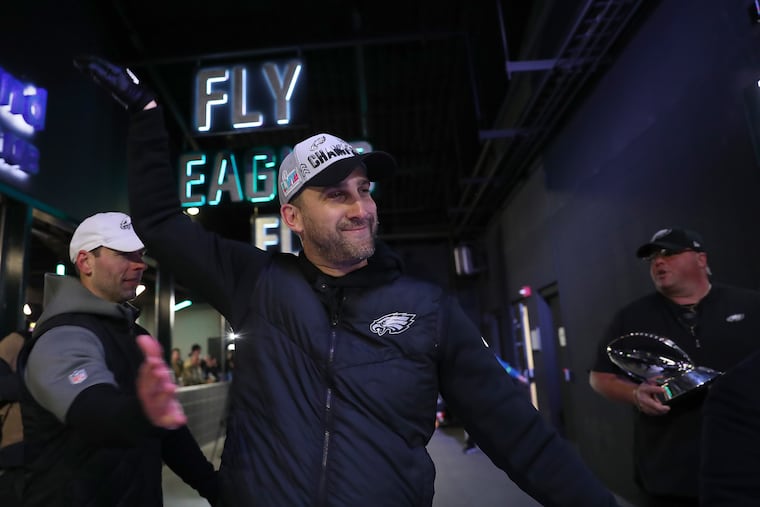It’s scary to make a prediction about Eagles-Chiefs in Super Bowl LVII, but here goes: The winner will be ...
One never knows what will influence the outcome of a big game. But it's a safe bet to pick the Eagles to win.

There isn’t much peril in being a sports columnist. It’s certainly not a dangerous occupation compared with, say, firefighting or crab-fishing, and it’s not even all that risky compared with other jobs in journalism.
A foreign correspondent might be wounded or killed while covering a war. Investigative reporters might have the punitive power of the U.S. national security community turned toward them and their sources. A general assignment reporter might find himself or herself caught up in a riot or threatened by a mob. The only mob a sports columnist is likely to encounter is the one that forms in the press box at halftime, when the free chicken tenders are served.
The one thing that can keep a sports columnist up at night, though, is what can loosely be called The Big Take Gone Bad. You analyze a situation or news development. You draw a conclusion, make a prediction, give your opinion — and, in doing so, put some of your credibility on the line.
Take, for example, the situation that developed during the Eagles’ game against the Los Angeles Rams on Dec. 10, 2017. Carson Wentz suffered a knee injury that would sideline him for the rest of that season, and one columnist wrote that Wentz’s absence would end any hope the Eagles had of winning the Super Bowl. Hey, as John Denver sang, some days are diamonds, some days are stones, and some days, Nick Foles catches a fourth-and-goal touchdown pass from a second-string tight end against the best coach/quarterback tandem in NFL history.
If there’s any hesitation here in weighing in on Eagles vs. Chiefs, it’s in that expectation: Who’s going to win? You do this for a living. You’re supposed to know. No hedging or side-stepping allowed here, Sports Guy. Even the truth — that the factors most likely to determine the outcome of Super Bowl LVII will emerge only in retrospect and with good reporting — is unsatisfying.
Just because the truth is unsatisfying, though, doesn’t make it false. Go back to Eagles 41, Patriots 33 on Feb. 4, 2018. It wasn’t until the game had ended and every piece of confetti had fluttered to a soft landing inside U.S Bank Stadium that everyone became aware of two major advantages that the Eagles had that night.
» READ MORE: Rock, Paper, Lessons: The Eagles’ Super Bowl run should teach fans, media, and the NFL some things
First, even though Doug Pederson had called plays with pedal-to-the-metal aggressiveness and daring all season, the Patriots still presumed that, on the biggest of stages, the Eagles would play it safe, or at least safer than usual. In a revealing piece of documentary footage from the game, New England running back Dion Lewis turned to a teammate — just as Pederson and Foles were deciding to run the Philly Special — and said, “It’s a no-brainer. He ain’t gonna go for it.”
No one who had paid any attention to the 2017-18 Eagles should have been surprised that the team that converted the most fourth downs in the league would go for it on fourth down in the Super Bowl. Yet Lewis and, presumably, the rest of the Patriots were. Think about it: A Bill Belchick team was outsmarted and unprepared. Yeah, totally predictable.
Second, after Foles struggled to run the offense as Pederson and Frank Reich had orchestrated it when Wentz was healthy, the two coaches revamped their entire play-calling strategy, going to a system with the run-pass option as its nucleus. The change made Foles more comfortable, but there was an even greater benefit: The 13 games that the Eagles had played with Wentz at quarterback were useless to the Patriots as study guides. Those games were irrelevant, because the Eagles were a different team, with different plays and patterns and tendencies, now that Foles was their quarterback.
“They couldn’t get a bead on us,” former Eagles tight end Brett Celek said the other day.
» READ MORE: Jeffrey Lurie’s Eagles have made a habit of firing coaches and getting to the Super Bowl. How do they do it?
So here we are, five years later, and at their core, the Eagles’ opponents in both of these Super Bowls are the same: two top-heavy teams, each with an all-time great coach, an all-time great quarterback, and an all-time great tight end. Belichick, Tom Brady, and Rob Gronkowski then; Andy Reid, Patrick Mahomes, and Travis Kelce now.
The biggest difference this time around is in the Eagles. Their roster is deeper and, top to bottom, more talented than the 2017-18 team’s — and the 2022-23 Chiefs’. Their offensive and defensive lines are among the best in the NFL, if not the best. They’re as healthy as a team can be at this time of year. It’s a scary thing, to offer a Big Take a week before the Big Game …
Ah, the hell with it. Let’s swing for the fences. Eagles 38, Chiefs 24.